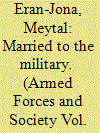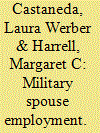|
|
|
Sort Order |
|
|
|
Items / Page
|
|
|
|
|
|
|
| Srl | Item |
| 1 |
ID:
114023


|
|
|
|
|
| Publication |
2012.
|
| Summary/Abstract |
Using the Broaden-and-Build Theory of Positive Emotions, the relationships among stress, positivity, and depressive symptoms were examined in a sample of military spouses during deployment (N = 367). Over one-third of the spouses reported moderately severe levels of depressive symptoms. After controlling for demographic and deployment variables, stress had a positive association with depressive symptoms (ß = .59, p < .001), while positivity had a negative association (ß = -.39, p < .001). Positivity was also found to play a moderating role on the relationship between stress and depressive symptoms (ß = -.29, p < .001). Spouses with lower positivity reported more depressive symptoms at both low and high levels of stress compared to those with higher positivity. The final model, including both direct and moderating variables, accounted for 69 percent of the total variance in depressive symptoms. Practical implications are discussed in terms of the importance of developing positivity in military spouses.
|
|
|
|
|
|
|
|
|
|
|
|
|
|
|
|
| 2 |
ID:
101324


|
|
|
|
|
| Publication |
2011.
|
| Summary/Abstract |
Twenty years after the last research was conducted on military families in the Israel Defense Forces (IDF), this study explores gender arrangements in families of male and female career military personnel as viewed by their civilian spouses. The research objective was to analyze the differences in attitudes toward family life and examine the differences in work-family practices among the IDF's career servicemen and women. The findings indicate that the IDF's heavy demands on career personnel, regardless of gender lead to the construction of family and couple arrangements that deviate from the norm in civilian Israeli-Jewish families of similar characteristics. For the servicemen, this demand creates a ''traditional'' role division model that places the entire burden of family work on their wives; for the servicewomen the same demands create a relatively ''egalitarian'' role division model, by placing more of the burden of ''family chores'' on their husbands.
|
|
|
|
|
|
|
|
|
|
|
|
|
|
|
|
| 3 |
ID:
169096


|
|
|
|
|
| Summary/Abstract |
When military community closure occurs, it can be challenging for service members and the surrounding community. Given that services and social networks disappear; this is particularly salient in overseas locations. Few studies have systematically assessed the impact of base closure on military community members. In the present study, 743 soldiers, 114 Army civilian employees, and 54 military spouses living in two closing U.S. military communities in Germany were surveyed about transformation stressors, mental health, and factors associated with better adjustment such as individual coping, leadership behaviors, and community cohesion. While individual coping was associated with fewer sleep problems, and individual coping and leadership were associated with less psychological distress, community cohesion generally overrode these effects in the final step of regression models. Thus, while coping and leadership are important, community connection appears to confer benefits to the affected individuals even in the context of base closure.
|
|
|
|
|
|
|
|
|
|
|
|
|
|
|
|
| 4 |
ID:
081195


|
|
|
|
|
| Publication |
2008.
|
| Summary/Abstract |
This study responds to the recognition that the majority of military spouses have paid employment but that neither the Department of Defense nor other organizations understand their motivations for work or their perceptions of how the military lifestyle has affected their employment. This article summarizes the input from more than a thousand military spouses who participated in interviews for this research. Qualitative and quantitative methods were used to examine spouse experiences and perceptions regarding their employment. Findings indicate that the majority of military spouses believe that the military has a negative effect on their employment. In addition, the interviews revealed that these spouses work for a variety of reasons, both financial and nonpecuniary. The reasons for the military's negative effect and spouse motives for working are discussed, along with the ensuing implications for policy
|
|
|
|
|
|
|
|
|
|
|
|
|
|
|
|
| 5 |
ID:
094142


|
|
|
|
|
| Publication |
2010.
|
| Summary/Abstract |
A survey of military wives (N = 77) identifies their most stressful experiences, self-appraised control over these stressors, and coping strategies used. The authors examine two competing hypotheses: the goodness-of-fit hypothesis that the effects of problem-focused coping (PFC) and emotion-focused coping (EFC) strategies on distress are moderated by the appraised controllability of the stressor, and the main-effects hypothesis that PFC strategies are more effective than EFC strategies in reducing distress regardless of appraisal of controllability. Wives identified deployment of soldiers as their most stressful experience, and reported using PFC strategies more frequently than EFC strategies. EFC strategies were predictive of greater physical symptoms of illness, while PFC strategies were related to reduced physical symptoms of illness only when military wives' perceived control of the situation was low. PFC strategies and controllability were significantly related to decreased depressive symptoms; EFC was marginally related to increased depressive symptoms, lending greater support to the main-effects hypothesis.
|
|
|
|
|
|
|
|
|
|
|
|
|
|
|
|
|
|
|
|
|